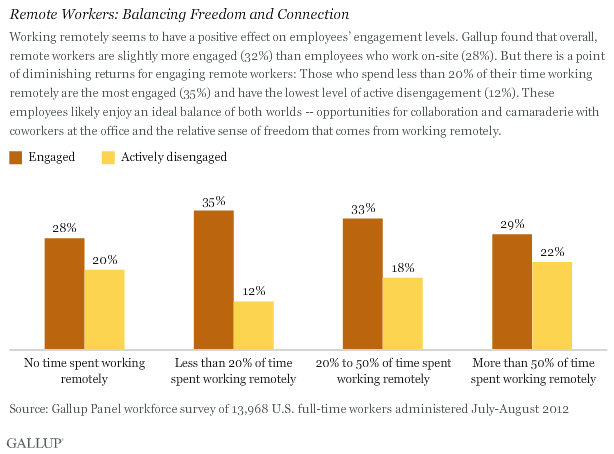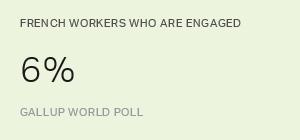Google's Vint Cerf emphasizes the importance of frequent opportunities for casual interactions between coworkers.
Yahoo CEO Marissa Mayer made headlines a year ago when she instituted a policy stating that the company's employees could no longer work from home except occasionally, when they had a specific reason for doing so. Yahoo's human resources chief, Jackie Reses, announced the change in a memo, saying, "To become the absolute best place to work, communication and collaboration will be important, so we need to be working side-by-side."
And Yahoo isn't the only business to be concerned about what may be lost when workers have little opportunity to interact directly. Just ask Vint Cerf, Google's vice president and chief Internet evangelist and Gallup Senior Scientist. Dr. Cerf is widely regarded as one of the fathers of the Internet for his seminal work on the TCP/IP protocols that form its underlying architecture, and the networking tools he helped make possible now allow many people to do their jobs from almost anywhere.
Google has faced its own challenges with employees working together while working remotely, according to Dr. Cerf. "We had people participating in teams, [and] they would almost never see each other face to face. Often they were in different time zones, which meant they had to work harder to stay in sync," Dr. Cerf says. "So we started recompiling groups to make them, if not co-located, at least within one or two time zones of one another so that it was more convenient to interact."
As more workplaces become knowledge based, more companies will experience the tension of helping employees work together effectively while allowing them to do their jobs from almost anywhere. Mayer's move sparked a national discussion about the best way to manage how new IT tools have changed the way U.S. workers communicate and collaborate -- and indeed how they have altered the definition of "workplace" itself.
Remote work -- in modest amounts -- linked to higher employee engagement
One of the most important questions regarding the ability to work from anywhere is the effect it has on employees' engagement levels. On the one hand, working remotely offers employees a measure of autonomy that helps them feel better equipped to do their jobs well. On the other hand, employees must have positive, trusting relationships with their managers and coworkers to stay engaged, and such relationships may be more difficult to sustain with fewer opportunities for face-to-face interaction.
Gallup's extensive employee engagement research -- presented in its recent State of the American Workplace report -- suggests that the ability to work remotely corresponds with higher engagement, but primarily among those who spend less than 20% of their total working time doing so.
- Among those who never work remotely, 28% are engaged -- meaning they are emotionally involved in, enthusiastic about, and committed to their work -- while 20% are actively disengaged, meaning they are unhappy at work and tend to disrupt their coworkers' productivity. The remaining on-site workers fall into a middle category -- not engaged.
- Among employees who spend up to 20% of their time remotely, 35% are engaged -- but engagement levels drop as employees spend more time off-site.
Dr. Cerf says that pattern makes intuitive sense: "There's a limit to the utility of remote work, and I think your statistics suggest that. You're seeing a positive response up to a point because people see that flexibility as a benefit, and then beyond that, you start to have less utility. So it's not a black-and-white situation."

Creative solutions may come from online summits -- or lucky lunches
Dr. Cerf notes that companies must strike a balance between the advantages online collaboration tools offer and the need for personal or informal interactions that boost workplace cohesion. This balance depends in part, he says, on the nature of the work and on the specific situation. In a crisis that demands a quick solution from experts in different areas, for example, "The ability to set up a collaborative environment literally within seconds is an extraordinarily powerful tool," Dr. Cerf says, "as opposed to having to coordinate everybody's calendar and waiting two weeks before we can all put our heads together [in the same room]."
But Dr. Cerf also emphasizes the importance of frequent opportunities for casual interactions between coworkers -- not just to build strong relationships but also to "cross-pollinate" talent and creativity among different workgroups. He notes that Google's work environments are designed to foster chance encounters that encourage employees to share ideas and information. There are whiteboards in many lounge areas to facilitate spur-of-the-moment brainstorming sessions, for example, and cafeterias are often set up like French family restaurants, with large tables so many people can sit together.
"You bump into folks and very casually strike up conversations," Dr. Cerf says. "You find out what other people are doing and possibly end up solving a problem because you have a different perspective on it than they do. You have to think about those kinds of interactions and plan for conditions that are conducive to that."
In the end, companies will have to devise policies that meet their own needs and values. However, they should carefully monitor the effects those policies have on employees' engagement -- and on their productivity. And they should be careful not to underestimate the need for positive relationships to support engagement.
"Establishing relationships is really important," Dr. Cerf says. "And one of the ways you do that is by face-to-face meetings, sharing a meal, or doing some other activity together. The fact that you establish some kind of human contact is important because then the remote meetings -- or the collaborative but not co-located meetings -- are reinforced by these personal experiences."
